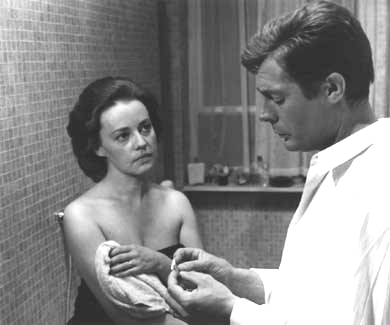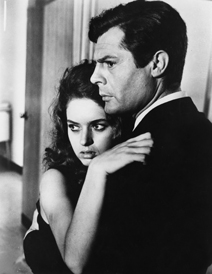
 |
|
|
|
Michelangelo Antonioni's 1957 Il Grido is a gritty drama about lower class romantic entanglements. Nine years later his England-set Blow-Up became the first of several internationally based movies. But the four features between those made Antonioni one of the most influential art film directors of the 1960s. Difficult to categorize, the pictures are commonly described as studies of modern alienation, or the failure of human communication. The central disappearance in Antonioni's L'Avventura goes unsolved when its affluent characters lose the will to continue their search. In L'Eclisse a similarly disconnected upscale couple's disaffection is partially expressed in abstract terms, using the modern city as a metaphor for lost humanity. The abstractions become an experiment in color in Red Desert, in which Antonioni's muse Monica Vitti leads a frustrating, fragmented life amid wrecked industrial landscapes. 
1961's La Notte is perhaps the most accessible film of the four, as it does not abandon its conventional story about a marriage in crisis. Retaining a realistic surface, Antonioni observes his disaffected husband and wife through their subdued, muted behaviors. Their feeling of emotional deadness is never difficult to understand. Architectural context is everything for this director. The modern city's cold surfaces seem to negate the human dimension, as if making honest relationships impossible. The first thing we see is a shot of a glass tower blocking our view of an older, traditional building. Popular novelist Giovanni Pontano (Marcello Mastroianni) and his wife Lidia (Jeanne Moreau) visit a hospital where their dear friend Tommaso Garani (Berhnard Wicki) is dying. Warm feelings are expressed, but Giovanni keeps his emotions in check. Giovanni will later be surprised to learn that Tommaso, an important mentor and inspiration for his writing, has always been in love with Lidia. Lidia leaves to wait outside, and Giovanni is almost seduced by a disturbed young woman from a room down the hall. Later, at a reception to celebrate Giovanni's new book, Lidia feels redundant. She excuses herself and spends the afternoon in a taxi, driving around the city to places where she once lived. She finally calls Giovanni from a neighborhood where some young men are firing off small rockets. Although Giovanni pouts and Lidia remains aloof, they end up attending an all-night party at the palatial home of the industrialist Gherardini (Vincenzo Corbella), where they are treated as extra-special guests. While the revelers dance to a live jazz band in the vast garden, the Pontanos go their separate ways. Each resents seeing the other behave in a lively and animated manner around other people. Lidia begins to flirt with a globe-hopping playboy, Roberto (Giorgio Negro), while Giovanni becomes fascinated with Gherardi's twenty-something daughter Valentina (Monica Vitti), who he finds reading his new book. 
La Notte is a study of modern Italian sophisticates that aren't coping well with their affluent, selfish lifestyles. The slightly jaded, self-obsessed Giovanni is so caught up in complacent comfort that his handsome face seems drained of real emotion. The neglected Lidia feels as if she has been cheated in life: at one point she was also involved in creative pursuits, and now lives in Giovanni's shadow. Women flock to the author like a magnet, leaving Lidia feeling like an accessory to an unappreciative husband. At one point she reads a passionate love note to Giovanni, who asks who wrote it. Lidia doesn't even express anger when she tells him that he wrote it to her, back when their relationship meant something. Lidia's wandering on the outskirts of Milan can't bring the past back to life. In her expensive clothes she's offered assistance; a bored taxi-driver patiently waits for her, presumably satisfied by the charge being rung up on the meter. The model rockets are an interesting diversion, and perhaps a symbol of the future Lidia might have had, if she had stayed single and pursued her own interests. Lidia and Giovanni glide into the fancy house party looking like a fabulous success story; they blend right into the crowd of privileged Italians celebrating their own wealth. The host regales Giovanni with talk about his vast business empire; he wants the writer to head up his company's new corporate culture and morale division. Signora Gherardini (Gitt Magrini) is the definition of the gracious society hostess, all clever talk and smooth introductions. Lidia is politely unimpressed. Giovanni is soon following the attractive Valentina around the glass walls of her father's designer mansion. They play a shuffleboard- like game on the checkered floor of the playroom, which becomes an impromptu arena and betting parlor for the party guests. Lidia allows the on-the-make Roberto to take her for a spin in his new sports car. Giovanni behaves as if he were free to toss his life away and run off with the first interesting woman he sees, something that Valentina is wisely aware of. Lidia realizes that she's incapable of making a casual conquest, no matter how unfulfilled she feels. As the dawn approaches, the Pontanos find themselves together again. Have they learned anything? |
|||||||||||||||||||
Review Staff | About DVD Talk | Newsletter Subscribe | Join DVD Talk Forum
Copyright © MH Sub I, LLC dba Internet Brands. | Privacy Policy
Subscribe to DVDTalk's Newsletters
|